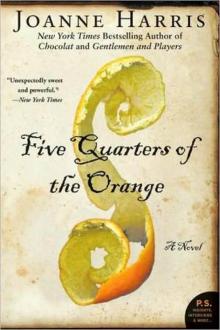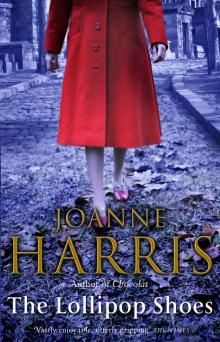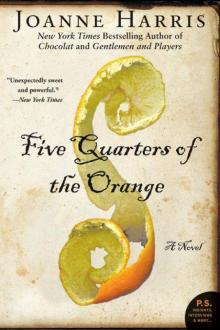- Home
- Joanne Harris
Chocolat Page 8
Chocolat Read online
Page 8
“You can’t stay here,” I called across the water. “This is private property. You must move on.”
Laughter and jeering from the boats. I felt an angry throbbing at my temples, but remained calm. “You can talk to me,” I called again. “I am a priest. We can perhaps find a solution.”
Several faces had appeared at the windows and doorways of the three boats. I saw four children, a young woman with a baby and three or four older people, swathed in the grey no-colour which characterizes these people, their faces sharp and suspicious. I saw that they turned to Red Hair for their cue. I addressed him. “Hey, you!” His posture was all attentiveness and ironic deference.
“Why don’t you come over here and talk? I can explain better if I’m not shouting at you across half the river,” I told him.
“Explain away,” he said. He spoke with such a thick Marseille accent I could hardly make out his words. “I can hear you fine.”
His people on the other boats nudged each other and sniggered. I waited patiently for silence.
“This is private property,” I repeated. “You can’t stay here, I’m afraid. There are people living along here.”
I indicated the riverside houses along the Avenue des Marais. True, many of these are now deserted, having fallen into disrepair from damp and neglect, but some are still inhabited.
Red Hair gave me a scornful look. “There are also people living here,” he said, indicating the boats.
“I understand that, but nevertheless—”
He cut me short. “Don’t worry. We’re not staying long.”
His tone was final. “We need to make repairs, collect supplies. We can’t do that in the middle of the countryside. We’ll be two weeks, maybe three. Think you can live with that, he?”
“Perhaps a bigger village…”
I felt myself bristling at his insolent air, but remained calm. “A town like Agen, maybe—” Shortly: “That’s no good. We came from there.”
I’m sure he did. They take a hard line with vagrants in Agen. If only we had our own police in Lansquenet.
“I’ve got a problem with my engine. I’ve been trailing oil for miles downriver. I’ve got to fix it before I can move on.”
I squared my shoulders. “I don’t think you’ll find what you’re looking for here,” I said.
“Well, everyone has an opinion.”
He sounded dismissive, almost amused. One of the old women cackled. “Even a priest is entitled to that.”
More laughter. I kept my dignity. These people are not worth my anger.
I turned to leave.
“Well, well, it’s M’sieur le Cure.”
The voice came from just behind me, and in spite of myself I recoiled. Armande Voizin gave a small crow of laughter.
“Nervous, he?” she said maliciously. “You should be. You’re out of your territory here, aren’t you? What’s the mission this time? Converting the pagans?”
“Madame.” In spite of her insolence I gave her a polite nod. “I trust you are in good health.”
“Oh do you?”
Her black eyes fizzed with laughter. “I was under the impression that you couldn’t wait to give me the last rites.”
“Not at all, Madame.” I was coldly dignified.
“Good. Because this old lamb’s never going back into the fold,” she declared. “Too tough for you, anyway. I remember your mother saying—”
I bit her off more sharply than I intended. “I’m afraid I have no time for chit-chat today, Madame. These people”— a gesture in the direction of the river-gypsies — “these people must be dealt with before the situation gets out of hand. I have the interests of my flock to protect.”
“What a windbag you are nowadays,” remarked Armande lazily. “The interests of your flock. I remember when you were just a little boy, playing Indians in Les Marauds. What did they teach you in the city, apart from pompousness and self-importance?”
I glared at her. Alone in all Lansquenet, she delights in reminding me of things best forgotten. It occurs to me that when she dies, that memory will die with her, and I am almost glad of it.
“You may relish the thought of vagrants taking over Les Marauds,” I told her sharply. “But other people. — your daughter among them — understand that if you allow them to get a foot in the door—”
Armande gave a snort of laughter. “She even talks like you,” she said. “Strings of pulpit cliches and nationalist platitudes. Seems to me these people are doing no harm. Why make a crusade of expelling them when they’ll be leaving soon anyway?”
I shrugged. “Clearly you don’t want to understand the issue,” I said shortly.
“Well, I already told Roux over there”— a sly wave to the man on the black houseboat — “I told him he and his friends would be welcome for as long as it takes to fix his engine and stock up on food.”
She gave me a sly, triumphant look. “So you can’t say they’re trespassing. They’re here, in front of my house, with my blessing.”
She gave the last word special emphasis, as if to taunt me.
“As are their friends, when they arrive.”
She shot me another of her insolent glances. “All their friends.”
Well, I should have expected it. She would have done it only to spite me. She enjoys the notoriety it affords her, knowing that as the village’s oldest resident a certain license is allowed her. There is no point in arguing with her, mon pere. We know that already. She would enjoy the argument as much as she relishes contact with these people, their stories, their lives. Not surprising that she has already learned their names. I will not allow her the satisfaction of seeing me plead. No, I must go about the business in other ways.
I have learned one thing from Armande, at least. There will be others. How many, we must wait and see. But it is as I feared. Three of them today. Tomorrow, how many more? I called on Clairmont on the way here. He will spread the word. I expect some resistance — Armande still has friends — Narcisse may need some persuasion. But on the whole I expect co-operation. I am still someone in this village. My good opinion counts for something. I saw Muscat too. He sees most people in his cafe. Head of the Residents’ Committee. A right-thinking man in spite of his faults, a good churchgoer. And if a strong hand were needed — of course we all deplore violence, but with these people we cannot rule out the possibility — well, I am certain that Muscat would oblige.
Armande called it a crusade. She meant it as an insult, I know, but even so…I feel a surge of excitement at the thought of this conflict. Could this be the task for which God has chosen me? This is why I came to Lansquenet, mon pere. To fight for my people. To save them from temptation. And when Vianne Rocher sees the power of the Church — my influence over every single soul in the community — then she will know she has lost. Whatever her hopes, her ambitions. She will understand that she cannot stay. Cannot fight and hope to win.
I will stand triumphant.
FOURTEEN
Monday, February 24
CAROLINE CLAIRMONT CALLED JUST AFTER MASS. HER SON was with her satchel slung across his shoulders, a tall boy with a pale, impassive face. She was carrying a bundle of yellow hand-lettered cards.
I smiled at them both. The shop was almost empty — I expect the first of my regulars at about nine, and it was eight-thirty. Only Anouk was sitting at the counter, a half-finished bowl of milk and a pain au chocolat in front of her. She shot a bright glance at the boy, waved the pastry in a vague gesture of greeting, and returned to her breakfast.
“Can I help you?”
Caroline looked around her with an expression of envy and disapproval. The boy stared straight in front of him, but I saw his eyes wanting to slide towards Anouk. He looked polite and sullen, his eyes bright and unreadable beneath an overlong fringe.
“Yes.” Her voice is light and falsely cheery, her smile as sharp and sweet as icing, setting the teeth on edge. “I’m distributing these”— she held up the stack of cards �
� “and I wonder if you’d mind displaying one in your window.” She held it out. “Everyone else is putting them up,” she added, as if that might sway my decision.
I took the card. Black on yellow, in neat, bold capitals:
NO HAWKERS, VAGRANTS OR PEDLARS. THE MANAGEMENT RETAINS THE RIGHT TO REFUSE TO SERVE AT ANY GIVEN TIME
“Why do I need this?” I frowned, puzzled. “Why should I want to refuse to serve anyone?”
Caroline sent me a look of pity and contempt. “Of course, you are new here,” she said with a sugared smile. “But we have had problems in the past. It’s just a precaution, anyway. I very much doubt you’ll get- a visit from Those People: But you may as well be safe as sorry, don’t you think?”
I still didn’t understand. “Sorry about what?”
“Well, the gypsies. The river people.” There was a note of impatience in her voice. “They’re back, and they’ll be wanting to”— she made a small, elegant moue of disgust “do whatever it is they do.”
“And?” I prompted gently.
“Well, we’ll have to show them we won’t stand for it!” Caroline was becoming flustered. “We’re going to have an agreement not to serve these people. Make them go back to wherever it is they came from.”
“Oh.”
I considered what she was saying. “Can we refuse to serve them?” I enquired curiously. “If they have the money to spend, can we refuse?”
Impatiently: “Of course we can. Who’s to stop us?”
I thought for a moment, then handed back the yellow card. Caroline stared at me. “You’re not going to do it?”
Her voice rose half an octave, losing much of its well-bred intonation in the process. I shrugged. “It seems to me that if someone wants to spend their money here, it isn’t up to me to stop them,” I told her.
“But the community…” insisted Caroline. “Surely you don’t want people of that type — itinerants, thieves, Arabs for heaven’s sake”
Flutter-click snapshot of memory, scowling New York doormen, Paris ladies, Sacre-Coeur tourists, camera in hand, face averted to avoid seeing the beggar-girl with her too-short dress and too-long legs…Caroline Clairmont, for all her rural upbringing, knows the value of finding the right modiste. The discreet scarf she wears at her throat bears an Herms label, and her perfume is Coco de Chanel. My reply was sharper than I intended.
“It strikes me that the community should mind its own business,” I said tartly. “It isn’t up to me — or anybody — to decide how these people should live their lives.”
Caroline gave me a venomous look. “Oh, well, if that’s how you feel”— turning superciliously towards the door — “then I won’t keep you from your business.” A slight emphasis upon the last word, a disdainful glance at the empty seats. “I just hope you don’t regret your decision, that’s all.”
“Why should I?”
She shrugged petulantly. “Well, if there’s trouble, or anything.”
From her tone I gathered the conversation was at an end. “These people can cause all kinds of trouble, you know. Drugs, violence…”
The sourness of her smile suggested that if there were any such trouble she would be pleased to see me the victim of it. The boy stared at me without comprehension. I smiled back.
“I saw your grandmother the other day,” I told him. “She told me a lot about you.”
The boy flushed and mumbled something unintelligible.
Caroline stiffened. “I’d heard she was here,” she said. She forced a smile. “You really shouldn’t encourage my mother,” she added with counterfeit archness. “She’s quite bad enough already.”
“Oh, I found her most entertaining company,” I replied without taking my eyes off the boy. “Quite, refreshing. And very sharp.”
“For her age,” said Caroline.
“For any age,” I said.
“Well, I’m sure she seems so to a stranger,” said Caroline tightly. “But to her family…”
She flashed me another of her cold smiles. “You have to understand that my mother is very old,” she explained. “Her mind isn’t what it used to be. Her grasp of reality—” She broke off with a nervous gesture. “I’m sure I don’t have to explain to you,” she said.
“No, you don’t,” I answered pleasantly. “It’s none of my business, after all.”
I saw her eyes narrow as she registered the barb. She may be bigoted, but she isn’t stupid.
“I mean…” she floundered for a few moments. For a second I thought I saw a glint of humour in the boy’s eyes, though that might have been my imagination. “I mean my mother doesn’t always know what’s best for her.”
She was back in control again, her smile as lacquered as her hair. “This shop, for instance.”
I nodded encouragement. “My mother is diabetic,” explained Caroline. “The doctor has warned her repeatedly to avoid sugar in her diet. She refuses to listen. She won’t accept treatment.” She glanced at her son with a kind of triumph. “Tell me, Madame Rocher, is that normal? Is that a normal way to behave?” Her voice was rising again, becoming shrill and petulant. Her son looked vaguely embarrassed and glanced at his watch.
“Maman, I’ll be l-late.” His voice was neutral and polite. To me: “Excuse me, Madame, I have to get to s-school.”
“Here, have one of my special pralines. On the house:” I held it out to him in a twist of Cellophane.
“My son doesn’t eat chocolate.” Caroline’s voice was sharp. “He’s hyperactive. Sickly. He knows it’s bad for him.”
I looked at the boy. He looked neither sickly nor hyperactive, merely bored and a little self-conscious.
“She thinks a great deal about you,” I told him. “Your grandmother. Maybe you could drop in and say hello one of these days. She’s one of my regulars.”
The bright eyes flickered for a moment from beneath the lank brown hair.
“Maybe.” The voice was unenthusiastic.
“My son doesn’t have time to hang about in sweetshops,” said Caroline loftily. “My son’s a gifted boy. He knows what he owes his parents.” There was a kind of threat in what she said, a smug note of certainty. She turned to walk past Luc, who was already in the doorway, his satchel swinging.
“Luc.” My voice was low, persuasive. He turned again with some reluctance. I was reaching for him before I knew it, seeing past the polite blank face and seeing — seeing…
“Did you like Rimbaud?” I spoke without thinking, my head reeling with images.
For a moment the boy looked guilty. “What?”
“Rimbaud. She gave you a book of his poems for your birthday, didn’t she?”
“Y-yes.” The reply was almost inaudible. His eyes — they are a bright green-grey — lifted towards mine. I saw him give a tiny shake of his head, as if in warning. “I d-didn’t read them, though,” he said in a louder voice. “I’m not a f-fan of p-poetry.” A dog-eared book, carefully hidden at the bottom of a clothes chest. A boy murmuring the lovely words to himself with a peculiar fierceness. Please come, I whispered silently. Please, for Armande’s sake.
Something in his eyes flickered. “I have to go now.”
Caroline was waiting impatiently at the door.
“Please. Take these.”
I handed him the tiny packet of pralines. The boy has secret. I could feel them itching to escape. Deftly, keeping out of his mother’s line of vision he took the packet, smiled. I might almost have imagined the words he mouthed as he went.
“Tell her I’ll be there,” he whispered, “when Maman goes to the h-hairdresser’s.”
Then he was gone.
I told Armande about their visit when she came later today. She shook her head and rocked with laughter when I recounted my conversation with Caroline.
“He, he, he!” Ensconced in her sagging armchair, a cup of mocha in her delicate claw, she looked more like an apple-doll than ever. “My poor Caro. Doesn’t like to be reminded, does she?” She sipped the drink gleefully. �
�Where does she get off, he?” she demanded with some testiness. “Telling you what I can and can’t have. Diabetic, am I? That’s what her doctor would like us all to think.” She grunted. “Well, I’m still alive, aren’t I? I’m careful. But that isn’t enough for them, no. They have to have control.” She shook her head. “That, poor boy. He stutters, did you notice that?” I nodded.
“That’s his mother’s doing.” Armande was scornful. “If she’d left him alone — but no. Always correcting him. Always carrying on. Making him worse. Making out there’s something wrong with him all the time:” She made a sound of derision. “There’s nothing wrong with him that a good dose of living wouldn’t cure,” she declared stoutly. “Let him run awhile without worrying what would happen if he fell over. Let him loose. Let him breathe.”
I said that it was normal for a mother to be protective of her children.
Armande gave me one of her satirical glances. “Is that what you call it?” she said. “The same way the mistletoe is protective of the apple tree?”
She gave a cackle. “I used to have apple trees in my garden,” she told me. “Mistletoe got them all, one by one. Nasty little plant, doesn’t look like much, pretty berries, no strength of its own, but lord! Invasive!” She sipped again at her drink. “And poison to everything it touches.”
She nodded to me knowingly. “That’s my Caro,” she said. “That’s her.”
I saw Guillaume again after lunch. He didn’t stop except to say hello, saying he was on his way to the newsagent for his papers. Guillaume is addicted to film magazines, although he never goes to the cinema, and every week he receives an entire parcel of them; Video and Cine-Club, Telerama and Film Express. His is the only satellite dish in the village, and in his sparse little house there is a widescreen television and a Toshiba video recorder wall-mounted above an entire bookcase of video cassettes. I noticed that he was carrying Charly again, the dog looking dull-eyed and listless on his master’s arm. Every few moments Guillaume stroked the dog’s head with the familiar gesture of tenderness and finality.

 The Evil Seed
The Evil Seed Gentlemen and Players
Gentlemen and Players A Cat, a Hat, and a Piece of String
A Cat, a Hat, and a Piece of String Different Class
Different Class Chocolat
Chocolat Five Quarters of the Orange: A Novel
Five Quarters of the Orange: A Novel A Pocketful of Crows
A Pocketful of Crows Runelight
Runelight Runemarks
Runemarks Jigs & Reels: Stories
Jigs & Reels: Stories Sleep, Pale Sister
Sleep, Pale Sister Holy Fools
Holy Fools The Testament of Loki
The Testament of Loki Peaches for Monsieur Le Curé
Peaches for Monsieur Le Curé Blueeyedboy
Blueeyedboy The Lollipop Shoes
The Lollipop Shoes Coastliners
Coastliners Jigs & Reels
Jigs & Reels Five Quarters of the Orange
Five Quarters of the Orange